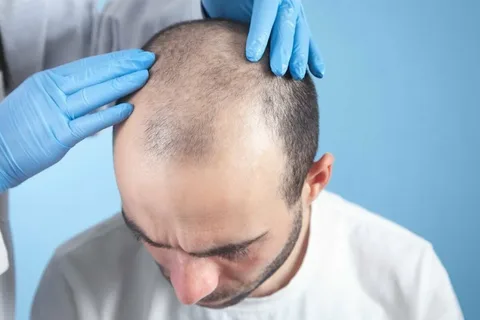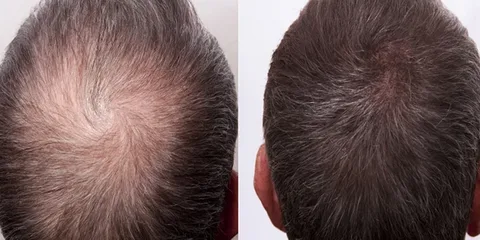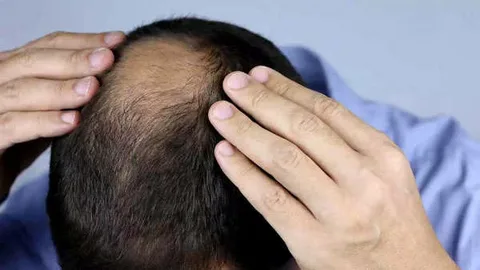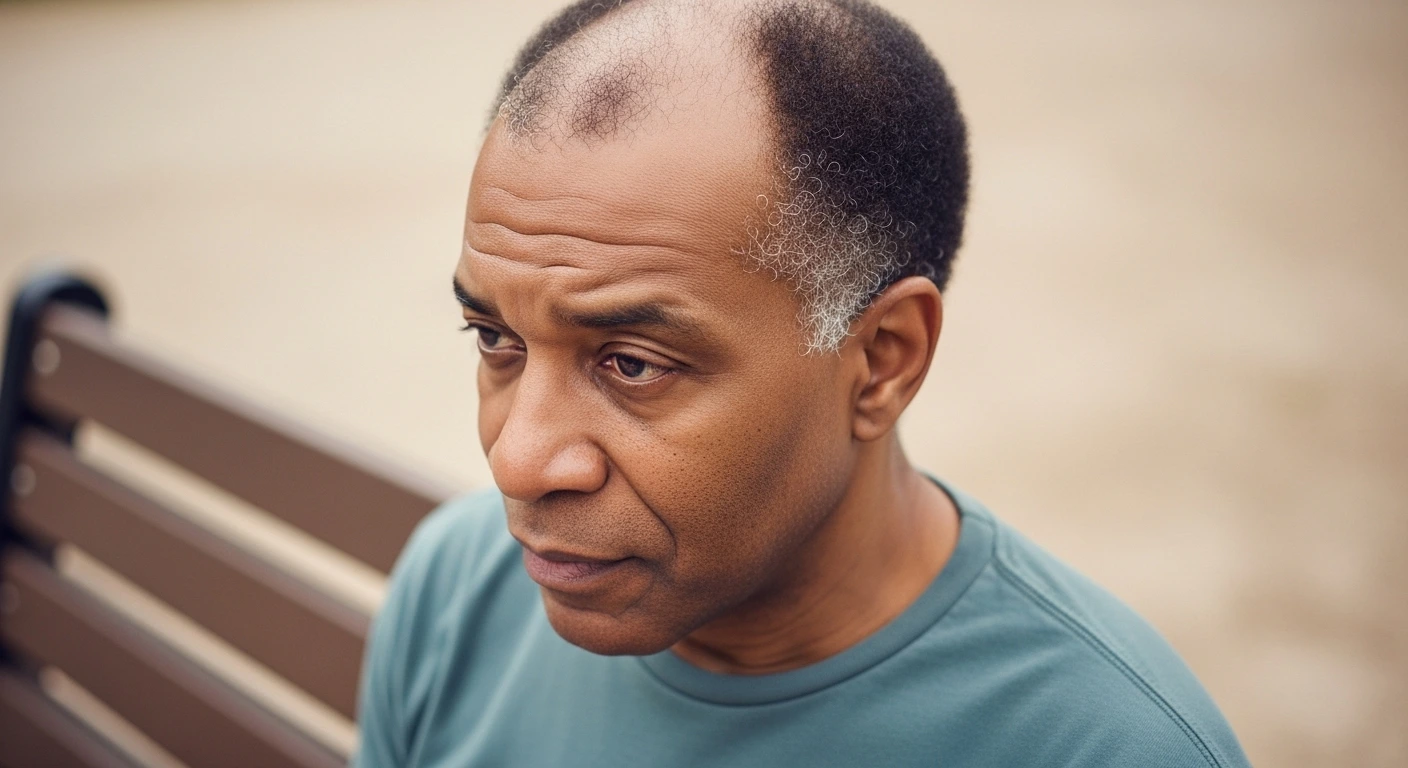Are you noticing hair loss while managing your blood pressure? The connection between blood pressure and hair loss may be more significant than you think. Whether it’s the result of poor circulation, medication side effects, or stress-related hypertension, your heart health could be affecting your hair. This guide explores the causes, medical insights, and expert …
Are you noticing hair loss while managing your blood pressure? The connection between blood pressure and hair loss may be more significant than you think. Whether it’s the result of poor circulation, medication side effects, or stress-related hypertension, your heart health could be affecting your hair.
This guide explores the causes, medical insights, and expert solutions so you can regain both confidence and control — naturally and safely.

Understanding the Link Between Blood Pressure and Hair Loss
Can High or Low Blood Pressure Cause Hair Loss?
Both high blood pressure (hypertension) and low blood pressure (hypotension) can impact hair growth. Hypertension may lead to vascular constriction, reducing blood flow to hair follicles and starving them of essential nutrients. On the other hand, hypotension may also prevent adequate circulation, affecting hair follicle function.
Hair loss can result when follicles enter the resting phase (telogen) prematurely. In this way, blood pressure—too high or too low—can disturb the hair cycle.
How Blood Circulation Affects Hair Follicles
Hair follicles need oxygen and nutrient-rich blood to thrive. Impaired circulation from high blood pressure or vascular constriction limits this supply, resulting in:
- Weak hair roots
- Increased hair shedding
- Stunted regrowth
Poor circulation also prevents the removal of waste products from around the follicle, causing inflammation and potential follicle miniaturization.
Scientific Explanation of the Connection
The hair growth cycle includes three phases: anagen (growth), catagen (transition), and telogen (rest). Disruption in blood flow can shorten the anagen phase and accelerate entry into telogen, leading to increased shedding. Studies suggest that chronic cardiovascular issues are linked to slower hair growth and thinning — especially in men with genetic predisposition.
Blood Pressure Medications and Hair Loss: What You Need to Know

Common Antihypertensive Drugs That Cause Hair Loss
Some medications prescribed to manage blood pressure may have hair loss listed as a side effect, including:
- Beta-blockers (e.g., metoprolol, atenolol)
- ACE inhibitors (e.g., enalapril)
- Diuretics (e.g., hydrochlorothiazide)
- Calcium channel blockers (e.g., amlodipine)
These drugs can trigger a condition called telogen effluvium, where hair prematurely enters the shedding phase.
Beta Blockers, Telogen Effluvium, and Hair Shedding
Beta-blockers, in particular, are often linked with temporary hair loss. They alter the hormonal balance and stress response, potentially causing widespread hair shedding two to three months after starting the medication. This is usually reversible if the drug is discontinued or replaced.
Case Reports: Patients Facing Hair Loss from Blood Pressure Meds
Many patients have reported sudden hair thinning after being prescribed certain BP medications. For example:
- A 45-year-old male developed diffuse thinning 3 months after starting atenolol.
- A female patient noticed patchy hair loss after switching to a new diuretic.
These real-life accounts emphasize the importance of monitoring side effects and discussing alternatives with your healthcare provider.
What to Discuss with Your Doctor
If you suspect your medication is causing hair loss:
- Do not stop taking it abruptly.
- Ask about alternative medications with fewer side effects.
- Consider blood tests to rule out other causes (e.g., iron deficiency, thyroid disorders).
- Inquire about topical treatments like minoxidil or prescription oral support.
Stress, Blood Pressure and Hair Loss: A Vicious Cycle

Chronic Stress as a Trigger for Hypertension and Hair Shedding
Stress is a silent contributor to both high blood pressure and hair loss. Long-term stress increases cortisol levels, which:
- Constricts blood vessels
- Raises blood pressure
- Triggers hormonal imbalances
Cortisol also impacts the hair cycle directly, contributing to shedding and slower growth.
Cortisol, Anxiety, and Scalp Blood Flow
High stress and anxiety can affect blood flow to the scalp, depriving follicles of oxygen. It also promotes inflammatory responses in the scalp, exacerbating issues like seborrheic dermatitis and dandruff — all of which weaken hair roots.
Lifestyle Habits That Link Stress, Hypertension, and Hair Loss
Stress-related behaviors such as smoking, poor diet, alcohol consumption, and lack of sleep also worsen hypertension and affect hair health. Over time, the combined effects can lead to both cardiovascular issues and visible thinning or balding.
How to Know If Blood Pressure Is Affecting Your Hair
Signs of Medication-Linked Hair Loss
Be alert if you notice:
- Diffuse thinning across the scalp
- Increased hair on your pillow or shower drain
- Hair becoming weaker or brittle after starting a new medication
These signs may suggest a link between your blood pressure treatment and hair loss.
Thinning Patterns Related to Circulation Issues
Poor scalp circulation from hypertension often causes general thinning rather than bald spots. Areas commonly affected include:
- Crown or vertex of the head
- Frontal hairline
- Temple regions
This mimics male or female pattern baldness but can have circulatory or medical roots.
When to Consult a Specialist
Consult a dermatologist or cardiologist if:
- Hair loss continues beyond 3 months
- You suspect medication side effects
- You have scalp inflammation or itching
- There’s a family history of hair or heart problems
Managing Blood Pressure and Hair Loss Naturally and Safely

Switching or Adjusting Medications (With Doctor’s Help)
If you believe your medication is contributing to hair loss, your doctor might:
- Adjust dosage
- Switch to a drug with fewer dermatological effects
- Recommend supportive treatments like biotin or topical minoxidil
Never stop BP medication without medical supervision.
Diet and Supplements for Hair and Heart Health
A diet that supports both cardiovascular and hair health should include:
- Omega-3 fatty acids (salmon, flaxseed)
- Antioxidants (berries, spinach)
- Protein (lean meats, legumes)
- Iron, zinc, biotin, and vitamin D
Supplements may help, but should be discussed with your physician.
Scalp Massage and Natural Remedies to Boost Circulation
- Daily scalp massage (5–10 minutes) improves local circulation.
- Natural oils like rosemary or peppermint oil may support follicle stimulation.
- Avoid heat styling or harsh products that inflame the scalp.
Stress Reduction Techniques for Hair and Heart Health
- Deep breathing and mindfulness
- Regular low-impact exercise (yoga, walking)
- Adequate sleep (7–8 hours)
- Journaling or therapy for anxiety
Reducing stress helps regulate cortisol, control blood pressure, and improve hair growth cycles.
Safe Exercise Routines That Help Both
- Brisk walking
- Swimming
- Light jogging
- Resistance training
These improve circulation, reduce blood pressure, and help restore normal hair cycles.
Real-Life Stories: Patients Managing Blood Pressure and Hair Loss
Case Study A – Male Patient, Age 52
Diagnosed with hypertension and placed on beta-blockers. Within 4 months, experienced diffuse hair loss. After switching to an ACE inhibitor and starting biotin supplementation, regrowth began within 3 months.
Case Study B – Female Patient, Age 41
Hair started thinning rapidly after beginning a new BP drug. A trichologist discovered telogen effluvium. Hair returned to normal within 6 months after a medication change and adding a Mediterranean diet.
Taking Control of Your Hair and Heart
Balancing Treatment and Quality of Life
It’s possible to manage blood pressure and hair loss simultaneously. With the right diagnosis, support, and lifestyle habits, you can reduce hair thinning without compromising heart health.
When Hair Loss Means It’s Time to Reevaluate Your Plan
If your current treatment is impacting your self-esteem or confidence, speak up. Ask your doctor to help you adjust your plan — your health and happiness are equally important.
FAQs
Is hair loss from blood pressure permanent?
No. In most cases, hair loss caused by BP issues or medications is reversible with proper treatment and time.
Can stopping medication reverse the hair fall?
Yes, but only under medical supervision. Never stop or switch BP drugs without consulting your doctor.
Can low blood pressure cause hair loss too?
Yes. Low BP reduces blood flow to the scalp, which can also affect hair health.
Which BP medications are hair-friendly?
There’s no one-size-fits-all, but some patients tolerate ACE inhibitors or ARBs better. Always consult a doctor before making changes.
Book a Specialist Consultation Today
Worried about hair loss from blood pressure medications?
Book a consultation with our trichologist or cardiologist Dr. Uzma Irfan, an ISHRS-certified surgeon in Islamabad in Islamabad for a personalized plan that protects your hair and your heart.






